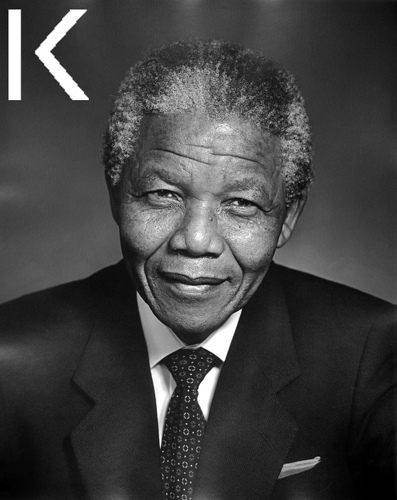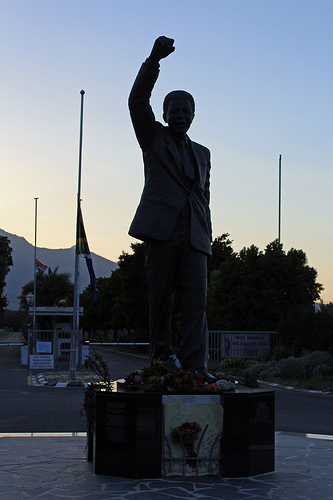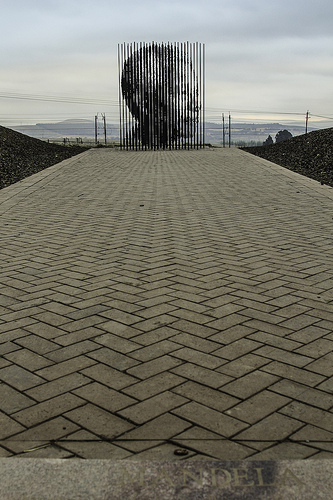With nearly a week gone since the announcement of Nelson Mandela's death, Caribbean bloggers have had time to process their thoughts on his life and his legacy.
St. Lucia-based Caribbean Book Blog noted that the island joined the international community “in celebrating the life of one of the world’s most beloved and revered leaders”:
Among the many virtues for which Nelson Mandela will be remembered is the way in which he was able to transcend politics, race and class, and recast himself in the role of a sagacious elder and father figure to all and sundry, even other political leaders and heads of state…

Nelson Mandela, photo by Festival Karsh Ottawa
The post recalled Mandela's 1998 visit to St. Lucia, to attend the 19th Meeting of the Conference of Heads of Government of the Caribbean Community:
Mandela’s humility, grace and charisma were evident…During the visit [he] attended a youth rally hosted in his honour. In his typically warm, affectionate style he charmed the youths and embraced them as they came up to greet him. Dispensing with protocol, he laughed and danced with them. He then offered them some inspiring words of wisdom and encouraged them to use education as a tool to become leaders. He urged them not to be discouraged by poverty.
The blog also reiterated Mandela's agreement with the notion that CARICOM has been at the forefront of the apartheid struggle; it ended by quoting Mandela's parting words to the St. Lucian people:
‘St Lucia is one of the most beautiful places I’ve visited. Its beauty is breathtaking. I know that one day I will die for a very, very long time but visiting St Lucia seems to guarantee to me that it will take some time before death prevails over me.’
He uttered those words in all seriousness. Fifteen years later they seem to have been quite prescient.
Jamaican diaspora blogger Can a Jamaican Take Cali? said that Mandela's example helped to shape his own life:
I remember vividly walking around my house singing ‘Free them President Botha’ the song that as a kid I was taught as part of the ‘struggle against apartheid’. Quick history Botha was the head of South Africa in the 80s and his government kept up a brutal crack down on Mandela, his ANC brethren and blacks in general. It has always bothered me that Botha was able to live out his life without ever going to prison – I really believe he should have died in prison, just as many of us feared Mandela would. To my knowledge Botha never apologized for apartheid, I find that hard to stomach but if Mandela could forgive him…maybe I should.
He also hoped that more young people would learn about Mandela's struggle:
Nelson Mandela always struck me as a man of poise, graciousness and strength of character, I sadly do not think enough of today's youths know who he is and honor and respect him enough. Hopefully his death, like much of his early life will renew in young black youth a sense of purpose a sense of internal pride and maybe just maybe a moment of deep reflection.

Mandela statue outside Drakenstein prison, in silhouette; photo by HelenSTB
The synchronicity of honouring Mandela on the occasion of World Human Rights Day was not lost on Jamaican litblogger Geoffrey Philp, while Breezeblog, from Bermuda, commended Mandela for leading by example:
If you or I were imprisoned unjustly for 27 years, much of it in solitary confinement, as Nelson Mandela was, we’d probably come out bitter and hellbent on exacting revenge on those responsible.
In the UK in the late 1970s, when I was in my teens and early 20s, many of my generation were seething at that injustice and the evils of the South African government’s apartheid system. Indeed, at a time when the right-wing National Front was on the rise, we were pretty worked up about racism in general. If we weren’t taking part in Free Mandela marches or concerts, then it was an Anti-Racism or Anti-Nazi League rally. We vilified those businesses or sportsmen who broke government sanctions and went to South Africa.
But if we believed that Nelson Mandela would one day be released, I don’t think any of us would have predicted that he would become the country’s first black President and that instead of spearheading the ANC in bloody retribution against their oppressors, he would lead an astonishing and courageous reconciliation that helped heal a bitterly divided nation and avoid almost certain civil war.
Nelson Mandela was already a hero of mine before he left prison. His dignity and humility after his release made him, in my eyes and those of millions of others, the greatest human being of our lifetime whose ideals and integrity put every other statesman in the world to shame.
Interestingly, the post also explored other opinions:
There were many other South Africans who viewed Madiba differently, as I found out when I finally got to visit the country in 2010 for the World Cup…As far as Frankie, the tough white lady who ran the guest house just outside Johannesburg where we stayed, was concerned, Mandela was still
‘a bloody terrorist’. Having grown up in a racist family and been violently assaulted in her own home by black criminals, Frankie feared and distrusted all blacks, viewed the ANC government as corrupt crooks and believed South Africa was going to hell in a hand basket.
The blogger, Chris Gibbons, was careful to note that:
Mandela’s Rainbow Nation is an incredibly complex country where racial and tribal divisions will take generations to heal, if at all, and the gap between the manicured wealthy suburbs and the grinding poverty of the townships remains jaw-droppingly vast.
But what Mandela did was to start South Africa on that journey, to offer hope where none existed and show that by working together and putting aside their differences, people can achieve truly remarkable things.
Another Bermudian blogger, Catch a Fire, felt that:
The best way to honour Mandela – the myth if not the man – is to renew the commitment to building a better world and launching a second liberation struggle.
This next liberation struggle is as relevant to Bermuda, the Caribbean and everywhere as it is in South Africa.
This second liberation struggle must overcome the covert and structural racism which still haunts our lands and even at a global level; it must also be a struggle against the colonialism of the mind, of colonial mentalities.
Even more, this second liberation struggle must be against a socio-economic system – capitalism – that threatens to consign whole generations and populations to the dust-heap, that thrives on war and that poisons our very planet, all in the pursuit of profit and not in the pursuit of realising our human potential.

Nelson Mandela sculpture by Marco Cianfanelli; photo by Fr Lawrence Lew, O.P.
Ivan Garcia offered a perspective from Cuba:
Madiba leaves as a legacy a master class of how to do politics in difficult times.
The current statesmen should take note. Mandela was not perfect. He was labeled a communist and disruptive, and until 2008 the FBI had him on their list of ‘terrorists.’ But he knew how to maneuver in the turbulent waters of a nation where state racism prevailed, in the intrigues of his party, the African National Congress, and to achieve the miracle of national unity in South Africa.
The colossal undertaking began in jail. From a cell in Robben Prison, where for 27 years he was behind bars, until 1994 when Madiba became president, he understood that in conditions of political fragility, his mission was to make sure that everyone saw themselves represented in the first democratic government of their country.
He was a president for all South Africans.
In his five years in office, Mandela sat chair of his magnificent policy. His ethics, honesty, and transparency were his hallmark. He was a partner of one and all, without ever compromising his political perspective. A man of diplomacy and respect for others.
His great friend in the Americas, Fidel Castro, retired from power, could also learn some lessons in transparency from Mandela’s conduct.
The post then compared the two leaders:
No one can doubt the sincere friendship that joined Castro with Madiba. But the two statesmen are nothing alike in their methods of achieving national harmony. If Fidel Castro had been like Nelson Mandela, he long ago would have been sitting at the table to negotiate with his political opponents.
First he would have visited with the dissidents. Then with the White House. If Mandela had been Castro, the embargo would be ancient history. That ability of Mandela’s — to adapt to changing times and live with democratic rules — is something the former Cuban president does not have.
In Cuba we would have needed a Nelson Mandela.
Diaspora blog Capitol Hill Cubans agreed that despite the friendship between the two, “Fidel Castro is the anti-thesis of everything that Mandela represents”:
Castro himself heads an undemocratic, apartheid regime.
However, to Castro's chagrin, upon being democratically-elected as President of South Africa, Mandela rejected everything Castro stood for.
Mandela could have taken the path of Castro or Zimbabwe's Robert Mugabe. He could have become ruler-for-life, confiscated the nation's vast wealth and made it his personal fiefdom.
Yet, Mandela chose the path of human rights, free markets and representative democracy. Moreover, he refused to serve more than one-term.
There is no greater test of a man than when he is given power.
Haitian bloggers were full of praise for Mandela. Le Coin de Pierre [Fr] compared him to Toussaint Louverture:
Ils ont eu le même idéal de liberté et d'émancipation de l'homme noir.
They had the same ideal of freedom and emancipation of the black man.
HaitiRozo called Mandela the leader that “brought the world together” and The Haitian Blogger posted a poem that urged readers to remember Mandela as he was, because the struggle still continues.
Trinidadian diaspora blogger Afrobella wrote a hopeful post, structured around some of Mandela's most famous quotations, which suggested ways in which all of us can live a life more like Nelson Mandela's:
We have lost one of the world’s greatest. We have lost a man who changed the world. We have lost one of the most iconic human beings, a living symbol of freedom and hope and the power of change. The weight of that loss cannot be understated.
He was a troublemaker for peace. He achieved so much and inspired so many. Now that he has passed, we can only pray that he rests in peace and power, and that his life’s legacy will continue to be one of inspiration, greatness and equality for all.
In the wake of Nelson Mandela’s death, I can’t help but consider the ways we could live up to such a legacy. Mandela’s shoes are so big, you might wonder what a regular person could do to fill them. I say, measure your life in terms of your intentions and your steadfastness, and celebrate Mandela’s legacy by speaking out for what’s right, leading by example, and sticking to your ideals.
Nelson Mandela silhouette, by HelenSTB, used under an Attribution-ShareAlike 2.0 Generic Creative Commons license.
Nelson Mandela, by Festival Karsh Ottawa, used under an Attribution-NonCommercial-NoDerivs 2.0 Generic Creative Commons license.
Nelson Mandela (1918-2013), by Fr Lawrence Lew, O.P., used under an Attribution-NonCommercial-NoDerivs 2.0 Generic Creative Commons license.







1 comment